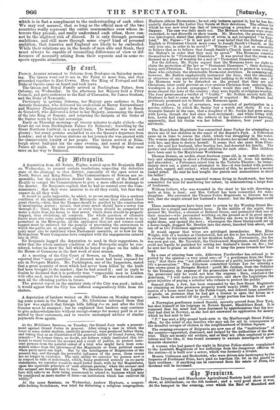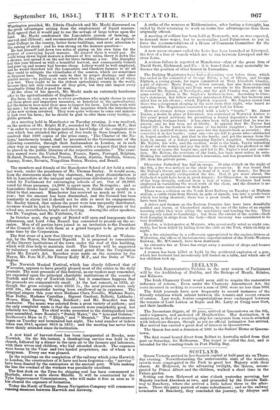t4t Vrnuiutto.
The Liverpool and Manchester Agricultural Society held their annual show, at .Altrincham, on the 8th instant ; and a very good show it was. At the banquet in the evening, over which the Earl of Stamford and
wartington presided, Mr. Edwin Chadwick and Mr. Mechi discoursed on the great advantages arising from the employment of liquid manure. Both agreed that it would pay to use the sewage of large towns upon the land. Mr. Mechi condemned the Lancashire system of farming, as starved and illiberal; and recommended the establishment of an Agricul- tural College in the county, better farm-buildings, and more attention to the raising of stock : and he was strong on the manure question— Ile had himself laid down two miles of piping on his own farm for the purpose of conveying liquid manure. He assured them it would pay. He could bring down liquid manure a distance of five miles, throw it down like a shower, and spread it on the soil for three farthings a ton. The Almighty had this year blessed us with a bountiful harvest, and consequently Consols bad gone up and money had become cheap. Labour would be well employed, and he would therefore tell the Lancashire and Cheshire farmers to do all they could to mitigate the vicissitudes of the seasons, which are sometimes so frequent here. They could only do that by proper drainage and other similar means—by putting on water where it is dry, and taking it off where it is wet. They ought to be the richest agricultural county in the world, because they not only consume all they grow, but they also import every imaginable thing that is good for man. At the close of his speech, Mr. Mechi made an extremely handsome offer to the agriculturalists of England— His farm, he said, was open to every gentleman who might choose to carry out these great and important measures, so beneficial to the agriculturists. Let the farmers here send their men to inspect his farm. Let them work with his men ; let them save all the cost of the inquiries which the introduction of the new system involved. They were quite welcome to come and minute- ly look over his farm ; for he should be glad to offer them every facility, on public grounds.
At a meeting held in Manchester on Tuesday evening, it was resolved, on the motion of Mr. Bright M.P., seconded by Mr. Cheetham M.P., that in order to convey to foreign nations a knowledge of the complete suc- cess which has attended the policy of free trade in these kingdoms, it is resolved that 1000 copies of the prize essay, The Charter of the Na- tions,' handsomely bound, shall be presented to the Governments of the following countries, through their Ambassadors in London, or in such other way as may appear most convenient, with a request that they may be placed in the public libraries of the respective countries." The coun- tries named were the United States, France, Spain, Portugal, Belgium, Holland, Denmark, Sweden, Prussia, Russia, Austria, Sardinia, Greece, Saxony, Rome, Bavaria, Neapolitan States, Mexico, and Brazil.
The members and friends of the Manchester School of Art held a soirée last week, under the presidence of Mr. Thomas Barley. It would seem, from the statements made by the chairman, that great dissatisfaction is felt in Lancashire at the unequal and capricious distribution of the funds voted by Parliament for encouraging schools of art. Out of 28,000/. voted for these purposes, 14,000/. is spent upon the Metropolis ; and as Lancashire thinks itself equal to Middlesex, it thinks itself equally en- titled to that amount. Manchester has received as much as 600/. in a year; but the amount has been diminished, and the Council has been constantly in alarm lest it should not be able to meet its engagements. Mr. Braley hinted, that unless the grant were less unequally distributed, recourse would be had to Parliament for redress. The prospects of the school are, nevertheless, bright and cheering. Among:the other speakers, was Dr. Vaughan, and Mr. Fairbairn, C.E.
In October next, the people of Bristol will open and inaugurate their Atherenum, and Lord John Russell has consented to preside on the oc- casion. Men of all parties have joined in an invitation to the President of the Council to dine with them at a grand banquet to be given at the same time by the Corporation.
The first stone of a new free library was laid at Norwich on Wednes- day, by the Mayor, Sir Samuel Bignold. It is proposed to concentrate all the literary institutions of the town under the roof of this building, which will thus help to maintain itself. The library will be supported by voluntary contributions and an annual grant from the Corporation under Mr. Ewart's Act. Speeches were made on the occasion by the Mayor, Mr. Peto M.P., Sir Fitzroy Kelly M.P., and the Duke of Wel- lington.
The Norwich Musical Festival, which has closely followed that of Worcester, appears to have greatly pleased most of the critics in the daily journals. The neat proceeds of this festival, as our readers may remember, are expended upon the principal charitable institutions of the county of Norfolk and the city of Norwich itself; but it sometimes happens that the proceeds are comparatively small. At the last concert, in 1852, al- though the gross receipts were 4665/. 7s., the neat proceeds were only 4931. 10e., the remainder having been swallowed up in expenses. The principal singers this year were Madame Clara Novello, Madame Basle, Miss Dolby, Madame Castellan ; Signori Gardoni, Belletti, Lablache ; Messrs.. Sims Reeves, Weiss, Reichert; and Mr. Benedict was the conductor. The music was selected from a great variety of authors ; and the only complaint made is that the concerts were remarkably good, but infinitely too long. The chief works presented to the distinguished com- pany assembled, were Rossini's " Stabat Mater," the " Acis and Galatea," Beethoven's Mass in C, "Elijah," and "Messiah." The performances began on Tuesday and terminated last night. The total number of tickets taken was 5943, against 6618 in 1852; and the meeting has never been more thinly attended since its institution.
A new kind of harvest-feast has been inaugurated at Brooke, near Norwich. On the 8th instant, a thanksgiving service was held in the church, followed by a dinner in the open air to the farmers and labourers, with their wives and children, who had attended church. The expenses were borne by the Vicar and two landed proprietors, one of whom is a clergyman. Every one was pleased.
In the rejoicings on the completion of the railway which joins Harwich to London' the constructors of it have not been forgotten—the "navvies" have been feasted by the contractors at the ancient port. While making the line the conduct of the workers was peculiarly excellent.
The first dock on the Tyne for shipping coal has been commenced at Hayhole, about a mile above Shields. It will be constructed by the Tyne Improvement Commissioners, who will make it free as soon as it has cleared the expenses of formation.
Today the North of Europe Steam Navigation Company will commence Binning steamers between Harwich and Antwerp. A strike of the weavers at Kidderminster, after lasting a fortnight, has ended by their returning to work on terms less advantageous than those originally offered.
A meeting of colliers has been held at Newcastle, not, as was expected, to demand more wages, but to memorialize Lord Palmerston to put in force the recommendations of a House of Commons Committee for the better ventilation of mines.
A new screw-steamer called the Loire has been launched at Liverpool, the first of a line of vessels which are to run between Liverpool and the river Loire.
A serious failure is reported at Manchester—that of the great firm of David Scott, Richmond, and Co. : it is feared that it may materially in- fluence the position of other houses in Lancashire.
The Dorking Magistrates have had a disgusting case before them, which has ended in the committal of George Elton, a lad of fifteen, and George Elphick, a young groom, for rapes committed on Mary Elizabeth Crauley, a girl of sixteen : Maria Ferns, a fellow servant, has also been committed for aiding them. Elphick and Fenn were servants to the Honourable and Reverend Mr. Sugden, of Newdigate, and the girl Crauley was also in the same service ; Elton is Mr. Sugden's brother-in-law. According to Crau- ley's statement, her fellow servants introduced Elton into her bedroom and aided him in his offence ; which Elphick repeated. Mr. Sugden stated that there was a clergyman sleeping in the next room that night, who heard no outcries. The Magistrates consented to accept bail for Elton.
Here are strange doings connected with a lady's "bustle." Mr. James Taylor, a dealer in glass at Liverpool, was sentenced at Warwick Assizes to five years' penal servitude for presenting a forged depositor's book at the Birmingham Savings-bank : it has since been fully proved that he was in- nocent, and he has been set at liberty. It appears that Mr. Taylor had lodged 22/. in the bank in the name of his infant daughter ; he borrowed money of a married woman, and gave her the deposit-book as security ; she concealed it in her bustle ; some one—we are left to guess who—abstracted it, forged another book, put that in the bustle, and got the money from the bank by means of a female personating Taylor's daughter. Subsequently, Mr. Taylor, his wife, and the creditor, went to the bank, Taylor intending- to draw out the money and pay the debt : the book that was proffered at the bank was of course the forged one, and led to Mr. Taylor's trial and convic- tion. Mr. Bolton, the secretary of the bank, has been most active in esta- blishing the unfortunate tradesman's innocence, and has presented him with 20/. from his private purse.
Gloucester Cathedral has had an escape. At nine o'clock on the night of the 8th, a fire was noticed in the choir by passers-by. It was found that the Bishop's throne and the seats in front of it were in flames; the Mayor and others promptly extinguished the fire. Had it got more ahead, the Cathedral would have been in great danger; - for Gloucester, in consequence of the long drought, suffered from a lack of water. Workmen had been employed in varnishing the wood-work of the choir, and the disaster is as- cribed to some carelessness on their part.
There was a collision on the North Kent Railway on Tuesday : at Higham station, a cattle-train from Strood, in spite of signals, ran into a goods-train which was being shunted ; there was a great crash, but nobody seems to have been hurt.
A driver and fireman on the Eastern Counties line have been dreadfully scalded and burnt, at Chesterford station, by one of the tubes of an engine bursting while they were oiling the machinery and tending the fire. They were quickly taken to Cambridge ; but from the extent of the scalds—their flesh hanging. in strips from the body—their recovery was considered to be very doubtful.
Hayden, a ticket-porter at Margate, who occasionally acted as night con- stable, has been killed by falling from the cliffs at the Fort, while on duty at night.
By a fire originating in a coffeeroom appropriated to the engine-drivers at Wolverton, the offices of the locomotive superintendent of the North-Western Railway, Mr. M'Connell, have been destroyed.
An extensive fire at Truro has swept away a number of shops and houses in that town.
A woman has been killed at Lydd by the accidental explosion of a gun, which her husband had incautiously left loaded on a table, and which one of her children took up.



























 Previous page
Previous page